Although the threat of full-scale nuclear war is low, there is always the possibility that we might end up with radioactive fallout in our drinking water.
An overseas regional nuclear exchange, nuclear accident, reactor explosion or meltdown, or a dirty bomb can all contaminate our water.
There are many filters available on the market that claim to remove 99 percent of radioactive particles, but the truth is that no one filter will remove all the particles from drinking water.
Disclaimer: This article is for interest and information purposes only.
What Types Of Radioactive Particles Might Be In The Water?
There are hundreds of radioactive particles that fallout will deposit over the land and in our water. Some of them will be short-lived, while others will remain in the environment for many years.
Related: How Far Away Would You Need To Be To Survive A Nuclear Blast?
Of the multitudes of potential isotopes we may find in fallout, strontium-90, cesium-134, cesium-137, and iodine-131 are of particular concern.
Strontium-90
This is more a concern in the fallout from a nuclear detonation rather than a meltdown or nuclear accident.
The problem with strontium-90 is that its half-life is 29 years which means that it can remain in the environment for hundreds of years before it decays to a point where the danger is negligible.
Strontium-90 can cause bone cancer and leukemia in people who consume contaminated food or water.
Cesium-134 And Cesium-137
Cesium-134 and Cesium-137 have half-lives of 2 and 30 years, respectively.
They are found in fallout, and if people are exposed to them, they can suffer from acute radiation sickness and possibly increase their cancer risk.
Iodine-131
This isotope has a half-life of only around eight days but has serious adverse health consequences for those exposed to it in nuclear fallout.
Iodine-131 will accumulate in the thyroid, potentially leading to thyroid cancer or Thyroiditis.
Many more isotopes can be found in water and food after exposure to fallout, but they are far too numerous to list here.
Filtering Radioactive Particles From Water
Three methods have been shown to filter most radioactive materials from water effectively.
However, no one filter will remove every radioactive particle, so if you want to set up a system to decontaminate drinking water after a nuclear detonation or accident, it is best to have all three on hand.
Even if you have a well-thought-out and secure water storage system in place, you will need to consider how you will supplement your water storage with rainwater. Here’s a guide on how to create an ingenious rainwater harvesting and purification system capable of storing 165 gallons of water.
Reverse Osmosis
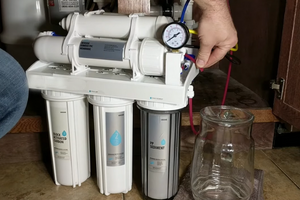 The EPA recommends reverse osmosis to remove many radioactive materials from water. It can remove 99% of uranium, radium, alpha or beta particles, and photon emitters.
The EPA recommends reverse osmosis to remove many radioactive materials from water. It can remove 99% of uranium, radium, alpha or beta particles, and photon emitters.
Reverse osmosis will not, however, remove gaseous contaminates such as radon.
In addition, Idoine-131 will not be filtered by reverse osmosis because it is an isotope that, when found in water, is a dissolved gas.
Reverse osmosis works by pushing water through a semi-permeable membrane. The water which passes through to the other side of the membrane is clean and mostly free of contaminants.
These systems usually employ several filtering steps to filter out and remove particles of differing sizes. Dissolved gasses, however, will find their way through the pores of the filter membrane.
Related: How To Build Your Nuclear War Survival Kit
Reverse osmosis filters are widely available and can even be installed in a home to filter water throughout the house.
With these filters, however, there is a problem of what to do with the contaminates that have been filtered out.
Systems designed for your entire home use a large portion of the water to wash away the waste through your household drains and into the sewer system.
In the case of radioactive fallout, you will be left with radioactive wastewater; in portable systems, you will be left with a wastewater tank to dispose of.
Ion Exchange
Ion exchange filters are often sold as water softeners, and they work by passing water through resins that contain positively or negatively charged ions.
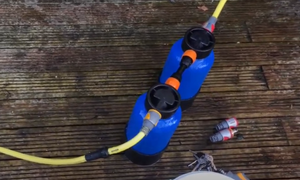 These ions essentially swap places with the contaminants in the water.
These ions essentially swap places with the contaminants in the water.
This is a dramatic oversimplification, but the basic idea is that the particles we do not want in our water are trapped in the resin filter media when safe ions replace them.
Related: The Easiest And Cheapest Way To Filter Water With Shungite
Unfortunately, ion exchange filters are not particularly good a filtering out viruses and bacteria or other bugs that can make us sick, so they are not suitable for a stand-alone water purification system.
Ion exchange has been found to be particularly useful in filtering our Cesium-137 but is also effective against uranium, radium, as well as alpha and beta particles.
Ion exchange has the same downfall as any other filter, where you will be left with filter resins that are now contaminated with radioactive particles.
Activated Carbon
Activated carbon filters absorb contaminants as the water passes through the filter.
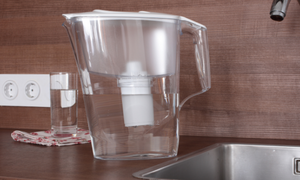
The problem with these filters is that once they reach their absorption capacity, they will no longer remove any particles.
Evidence suggests that carbon filters effectively remove radioactive fallout from our water.
Related: How To Make Your Home Fallout Proof
Still, as with all filters, they will not remove 100 percent of the radioactive particles.
Some reverse osmosis filter systems will also include an activated carbon stage within the filter. However, it would still be a good idea to have an external one as a redundancy.
As with other filters, once an activated carbon filter has reached capacity, it will be full of radioactive fallout, which needs to be disposed of appropriately.
What Filter To Use
The best way to filter radioactive particles from your water after an attack or accident is to develop a system that uses all three filters.
You could start with an activated carbon filter to get most of the particles, followed by an ion exchange filter to soften the water and remove some missed particles, then complete the process with a reverse osmosis filter.
Regardless of how you set up your system, you will need extra filter media for each filter and a method to safely dispose of the waste.
Food and water security will be a paramount concern after any nuclear incident, regardless of what it is.
The most crucial thing to consider is establishing your filtering method well before you need to use it.
You may also like:
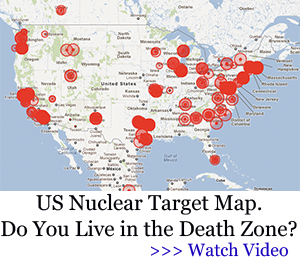 How To Make Prepper Fruit Cake That Can Last For Decades
How To Make Prepper Fruit Cake That Can Last For Decades
The Awesome DIY Device That Turns Air Into Fresh Water (Video)
These Are The People You Want To Keep Around When SHTF
Better Than Aspirin: The Plant Every Prepper Needs In Their Cabinet

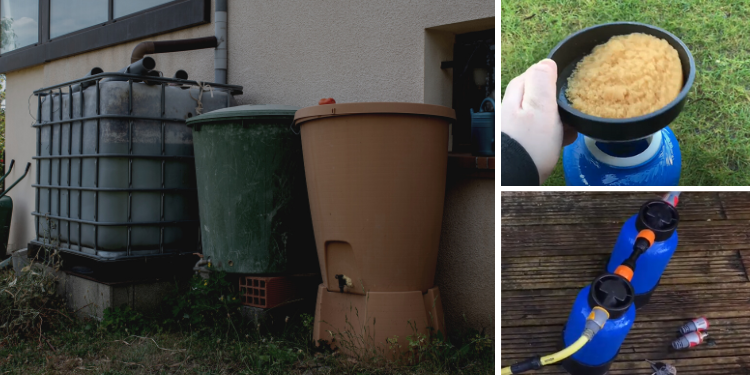
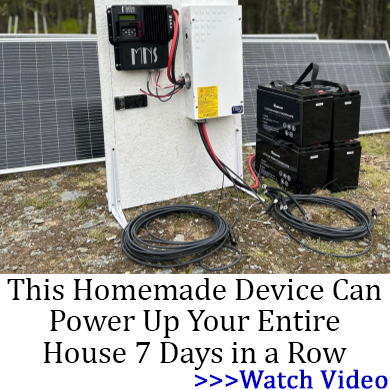
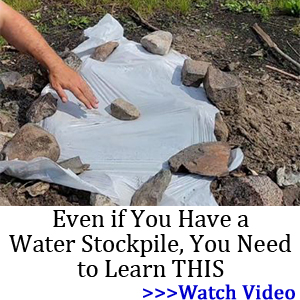
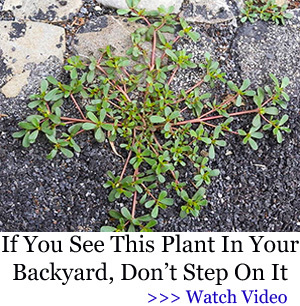

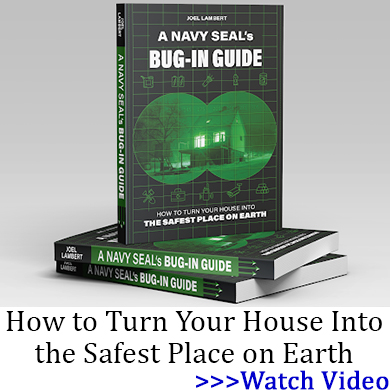




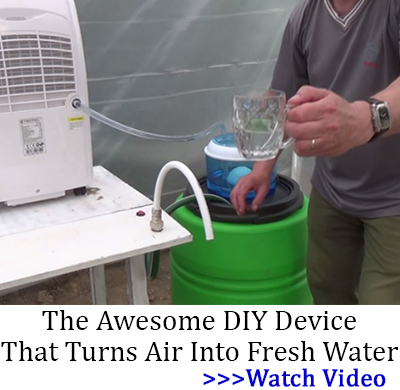
Ummmmm
Not a nuclear expert. However, from my limited NBC training and studies of Hiroshima and Soviet Nuclear tastings surface water is going to be contaminated by fallout. I’d not be collecting rain for water for several weeks myself. Black Rain was a Japanese issue after we nuked them twice.
Happily, the amount of radioactive material with true long half life is limited to the mass of the warheads. A few kilograms of actual nuclear material = Megatons of destruction.
The massive tons dirt and debris lifted into the fireball provides the bulk of the 14-day radiation fallout issues.
Well water will be reasonably safe. Serious concerns about animal and food plants uptake of fallout esp. Strontium 90.
Information about the fallout results in Japan are still oddly lacking.
Got a well and way to get water from it after the grid is down? Got two years’ worth of stored foods? Most important got a few trusted friends?
I would have liked to have seen some suggested brands of these filters.
Mike Adams did an extensive study with over 30 filters and the results are on his page Health Ranger Report on brighteon.com. But the top filter for the cheapest was the zero filter found at walmart and target. It beat the expensive ones but a few parts per billion.
Yeah, but those filters (zero filter) only filter about 12 gallons before they need to have the filters replaced. I checked them out once and when I saw that I decided not to get it because the cost for filters would be horrific!
I bought a whole house SpringWell system with the UV light attachment and reverse osmosis at the sink and the softner. Moen bought them not too long ago. It’s not cheap but I would not drink water and I hate the plastic water bottle crisis we have. First time I’ve drunk water from my own home in 40yrs. And it tastes good:) I found a clever handy man to install it on my lanai in the back of the house. It’s something I thought should be kept out of sight and protected. It does say on the site that if you’re handy you can diy. I paid, for whole house filter, softner, UV ‘cleaning’ and reverse osmosis around $4000. Affirm lender helped me make payments at around $391 a month for a year so it can be ‘haveable’.
A home distiller can be of value.
Gasses will offgas, heavy materials will settle to the bottom.
And the high temperature of a distiller can sterilize the water.
“Heavy” is a relative term. Any matter can be radioactive, including water and air. While a distillery would take care of the outgassing issue, as long as it vented to the outside world, and the “fines” will settle to the bottom, 2 issues are still present. If the incoming water is radioactive, it still will be radioactive after use. Also, the “settlins” will need to be removed regularly, as in each batch or you will have ‘hot’ mud in the bottom of the still. But, if you can procure good clean, non-radioactive water, possibly using a high quality prefilter, and some quality ingredients, at least you won’t be too upset about the results because you’ll have a nice relaxing beverage to partake of and possibly share with others.
if the water was turned into steam and then cooled to water would this remove the radioactivity?
I agree. Distillation is best for producing pure water, free of any and all hazards. Glenn Meder once sold a portable Distiller and may still sell these. They are stainless; basically a pot on the bottom that boils the water, with a distiller on top to catch steam and drain it off into a jar, cup, whatever; and a second pot of cold water on top of the distiller to condense the steam vapor back into water. I bought one. It worked, but was time consuming. I ran it on an electric stove top on High for about 40 minutes to get less than 2 cups of water. That is a lot of utility cost and time for a mere 2 cups of purified water. He also put out a stainless rocket stove that I also bought that directs heat from small branches directly upward. He said campfires consume only 50% of the energy burned, dissipating wood gas with the smoke and losing 50% of the wood’s energy. The rocket stove corrects that energy loss. Since I have big old Maples always dropping branches (that I save)–That will be my fuel and not electricity. Here is an old link:
https://www.waterworld.com/municipal/drinking-water/article/16215931/new-drinking-water-distillation
Just make sure you have a way to ‘remineralize’ the water. Drinking lots of distilled water can actually kill you if you drink enough of it without the minerals our bodies need.
But yes, I have a distiller, and drops to remineralize.
a pinch of Himalayan salt per gallon will also help. I buy it by the 5lb containers. Salt is a must prepping item. Don’t buy ‘iodized salt’.
Sounds good however many states like where I live (NY) will throw you in the klink even just for having a distiller or distilling parts if they find out.
How really safe will well water be? Will it not also be contaminated by particles filtering through to the below-ground aquifer? Are there any studies that reveal this answer? Also, what must one do to dispose of the radioactive particles filtered out by these filtering treatments? Thank you for providing this article as it is both thoughtful and timely given the state of world affairs.
Interesting question on the disposal issue. Other than digging a pit, putting a concrete burial liner in the ground and putting only radioactive waste in it, i’m not sure what would be a really good, healthy, lasting solution. And the burial liner solution leaves you, eventually, with a concrete vault filled with radioactive waste that need to go somewhere. I suppose that you could put 4 in a row and seal each one as it gets full. Thinking it would take many years to fill 4 of those with radioactive waste in solid form. If you’re talking liquid waste, well any septic system is gonna, basically return the waste to where it came from, as in the outside world. True, a city septic system, if still functional, would bring the vast majority of wastewater to a treatment plant of some sort. Possibly eventually rendering it dangerous to be around. Don’t know. You don’t really just want to bury it in the back 40 as it will leach into the water supply unless you put it in some sort of sealed container. Not sure what incineration would do to the radioactive particles themselves, but unless you had a really top-notch exhaust filter system in place, at least some of those contaminants you would be sending up in the air. Obviously, starting the whole process over again. I don’t have enough knowledge in this area. Betting Uncle Sam has worked this out to a fine degree, but since they’ve been burying nuclear waste deep inside old mines and mountains for years, they obviously don’t have a bulk or mass production solution to the problem either. Very interesting topic.
Put them on your neighbors porch and let them use them. Lol. If it comes down to this really you are not going to survive.
The “safely dispose of” phrase begs another question. Are there currently available disposal facilities that will take nuclear waste-contaminated materials? If not, is there a “safe” disposal procedure that can be done by the average person?
It would be an interesting, and necessary, continuation of this discussion. Thanks
Throw it over your fence to the neighbors you don’t like. Lol
Wilford, you are a prime example of why i stay on good terms with all of my neighbors!
You can guess the answers to the facilities question, as of right now that’s a restricted access facility and for good reason. Obviously also, in a post nuclear conflict world the answers to your question will be very different than say, right now for example. But, to cut to the heart of what you’re asking, lets say you’re chucking some contaminated water filters. Put on disposable latex gloves, chuck them into a bucket lined with a walmart bag or similar, and when you get to where you’re gonna deposit them, likely a garbage dump of some sort, peel the gloves off, chuck em in the bag that’s in the bucket. Then tie the bag’s ears shut tightly and give er the ol’ heave ho in the appropriate direction. That’s what, or some variation of it, everybody at the general public level, is gonna do. Oh, one last thing. The “good reason” that i mentioned above for restricting access to radioactive waste, especially Highly contaminated waste is a “dirty bomb”. Ya take a flimsy container of such waste, pack explosives around it, park it on top of a tall building in any downtown area of a densely populated city and set it off. There’s no mushroom cloud, and likely only minor damage to the building. But you’ve just made a whole lot of very radioactive material airborne and it will start to settle into the immediate area very quickly. Rendering square blocks, if not square miles of a major city uninhabitable. Reason for all that mention is that the only REALLY good places for such regular waste are gonna be facilities that the general public has no access to. How ironic.
I worked at an aquarium for years. We used reverse osmosis filters extensively. This filter will do no good, as with the others you mentioned, if there isn’t significant water pressure to drive the water through the membranes. Even at 150 psi your reverse osmosis filter will “trickle ” about a gallon an hour. If there is any disruption to the grid, water pressure will not run, as most water supplies are “pumped ” to homes. So before you spend hundreds on these expensive filters, ask yourself if your water supply can provide the pressure, if you can replace membranes after each use, and how you would store it.
I plan on using Coffee Filters
You use those to Hunter when you cook up your crack?
Coffee filters are Mighty Useful items indeed! Seriously, lotsa things can be filtered safely with a coffee filter. From food and drink items, to chemistry related processes, mentioned above, lol. I have numerous large coffee filters and i currently use them for…….wait for it….COFFEE! LOL. Occasionally i use them to filter junk out of antifreeze from a drain pan.
The white tyveck type filters are good for lining flower pots and keep soil or orchid bark from going out the bottom.
A lot of legitimate issues and some reasonable solutions brought up in the article and the responses. Any water collected from a stream or rain water off the roof would be a last resort and multiple steps would be required to reduce the danger to acceptable levels. Michael is right, well water would be my first chose. Not a shallow well but rather one that is more than 100 ft down and has a layer of shale or bedrock above the water bearing gravel layer. The recharge area is likely 50 to hundreds of miles away and the water you withdraw may have entered that formation over fifty years ago and is protected by being so deep in the ground.
I use a Berkey with gravity fed carbon filters. How long will those black carbon filters last in a radioactive environment? Would you suggest stockpiling those filters?
OK, So if Reverse Osmosis is Not Gonna Work, then “What Does Work”. ? I Have a Gravity Fed Berkey System. That is Not Attached to Any Waterline & I just bought 2 Drinking Tumblers that Filter’s Out Radiation & Extra Filter’s. What Else can I Do. ? This is Scary.
Go home and go fishing.
–Neville Schute.
Neville Shute was an ignorant, misinformation peddling anti-nuke activist. He apparently knew next to nothing about Radiation, Atmospheric Transfer or few of the other devices upon which he based his novel. BTW, don’t eat any of the fish you catch, they are probably all contaminated with Mercury or DDT, or Dioxins. Living is hazardous to your health.
The author suggests using all three that he had covered. If you are trying to clean up a surface water source that has radioactive particles in it I would suggest coagulation with something like alum, a settling period, sand filter, bring it to a boil to off gas any thing you can, then carbon filter, ion exchange, R.O. and then hope for the best as you faithfully take you iodine tablets. You are never going to get it all out. That is why I prefer a protected source.
I get my water from cosco, comes from Canada eh!
If we have a nuclear war and the fallout gets into your drinking water or food. You drink it and eat it until you die.
There is no solution for the majority. Yes if your rich enough to purchase all these filters and the stand alone systems for power to power these filters, have fully stocked fall out shelter, you might increase you life span for a year if everything, I mean everything is done 100% correctly and that includes breathing systems, water systems, storage of food and water. But time is against you because the nuclear radition will be there for years to come. The animals have no protection so they will die. The plant life has no protection so it will wither and die.
The problem you will have is knowing a nuclear blast has happened and which direction the fallout is traveling. If you are close enough to see it or hear it then it is already to late because by the time you react and move the radiation will have gotten to you. I do not care what the scientist say about the distances from the blast center, why because you will not know what size the warhead was. Ask your self would you know if it was a 100 megaton or a 1000 megaton? The distance from you will be unknown so it can not be computed.
I was taught in the military that if we were dug in a trench and covered ourselves with our tent halves we would survive the iniatial effects so we could continue fighting for a few weeks to a month before we started getting sick and then in a week we would not be able to move around then another week and we die.
So my hope is the blast is right on top of me. Be over and done with.
Ask your self is survial worth it if your doomed to a life of sickness?
Russia built a 100 megaton hydrogen bomb and tested it and found that a 100 megaton bomb does not do any more destruction than a 50 megaton bomb. So in the interest of saving money, their largest nuke is a 50 megaton bomb. I personally live only a couple of miles from a strategic military site so If global thermal nuclear war happens, I will certainly be toast-period and that’s what I want because I am old and will not live very long anyway. and this is a SHTF situation I do not want to survive at all. We all gotta die sometime. Can’t ask for a quicker death and my nephews and nieces who survive won’t have any funeral expenses because my physical body will be vaporized.
Radioactive fallout from ground zero will be literally blown with the wind and that’s where the highest concentration of radioactive fallout will be. A half life of a radioactive isotope is that period of time in which radioactivity decays to 1/2 of initial radioactivity. Two half lives, radioactivity is at 25% of initial strength 3 half lives = 12.5% of initial radioactivity strength.
Should you be unfortunate enough to survive a nuclear detonation near where you are at, it is to absolutely stay essential to stay inside for 2 weeks and already have at least 3-4 weeks of water for hydration and sanitation. There will be no electricity, no public water supply, nor any natural gas supply because all utilities will be destroyed. A 1 megaton nuke is 50 times more powerful than the nukes dropped on Japan in WWII. A 50 megaton nuke is 2,500 times more powerful than the 2 nukes dropped on Japan.
Once 2 weeks have passed, take only the very essentials you need from traveling and survival and get as far away into the countryside and as far away from any military strategic potential bomb sites as possible. Ground water, even from an artesian spring will be much much safer than ordinary surface water. Save all charcoal from campfires, and crush it into the smallest particles possible and put the crushed charcoal (activated charcoal) into a 5-gallon bucket with holes in the bottom of it and a screen in the inside bottom of it for water filtration. Water distillation will only kill organic pathogens (bacteria, etc.). Radioactive fallout are radioactive particles and will not leach into groundwater in any significant amount unless maybe at or very near ground zero. This would be a situation where you absolutely have to bug out. Too many people today think they’ll move into the countryside and survive as a “rugged individualist”. The “mountain men” who hunted and trapped wildlife for furs in the early 1800’s were very tough and rough men who were “rugged individualist” and more than 50% of these guys died an early death as a direct result of their profession. Hence, any other survivors you come across, you should band together with them because you will need their support and they will need your support. To quote the late and great Michael Ruppert, “You will fail as a rugged individualist. You will survive as a member of a community.” The governments will take care of the governments–period.
@Dreaded
Ask yourself, did they tell you that because you where soldiers expected to continue fighting until death?
That doesn’t mean you can’t survive it outside of a battlefield situation with better protection. You painted a picture of just being outside in a trench exposed directly to the radiation after the initial blast. Of course you would get sick, and likely die. Someone who had four walls and a roof above them would do better. Someone with a two story house and layers of walls over a sealed up basement stocked with fresh water would do significantly better. Probably even coming out of it without serious sickness. Especially if they where able to avoid contamination for the first few weeks when the worst of the radiation threat would likely be passed.
Absolutely! I am currently 82 years old and have had near debilitating Arthritis since I was 15. I still managed to survive a career in the Army including a tour in Vietnam. Every morning when the Sun comes up, I feel the same joy I felt at 15. In the event of a Nuclear War, I will feel sorrow for the dead and the soon to die, assuming I’m not one of them. I will not however roll over and quit. I will do my utmost to survive and help others to do the same. Thats just one of the reasons I Prep. If you think like a Victim, you will Act like a Victim. I prefer to think like a survivor.
Would it be possible to fill a bathtub with good clean water at first notice that a strike occurred – before fallout? Keeping it covered by tape and plastic and use only for drinking.
Yes
Where are the most likely area for
Most likely area for a nuclear attack?
Militairy base
There are health products (supplements) that are used by detoxification doctors to eliminate “heavy metal” contamination in the blood stream. All radioactive ions are heavy, therefore similar to what are called heavy metals (lead, cadmium, etc.) poisoning. One supplement material that keeps getting attention in the literature is called PECTIN from the white inside skin layer of orange peels. Keep in mind that with the correct testing equipment a person’s blood can be checked for the presence of “heavy metal (including radioactive ions) before testing. Then after a treatment period of time the blood can be rechecked for the presence of heavy metals and how much percentage of change is in the blood stream. When these treatments work, they become major health promoting aids. But a concerning matter in the elimination of heavy metals and radioactivity in the body is that anything imbedded deeply in the body will, or may take considerable time to reach the blood stream, or the Lymph gland fluids that drain down the big-tube and the little-tube. So my point is that most Detox Doctors recommend taking these substances, like Pectin, for life. The point here is that as we may be able to keep radioactive particles, but also unhealthy heavy metals (some are the adjuvants –the chassis framework for carrying vaccines–deep into our body). As we remove radioactive and heavy metals our health improves.—as we remove them from our body, then if some plants are radioactive, a lot of waste product will go out the Big Tube and it will be gone (Bury it deep in an Outhouse). The Little Tube is directly connected with the small intestine another radioactive drain port in the body. The liver and kidneys detoxify, and they will need daily help (such as Pectin ions in the blood stream to snag heavy metal particles along with virus, bacteria, parasites, fungi-allergens and poisonous toxins (that originally were snake and spider bites, and now are just about anything under the sun). Vitamin C especially Liposomal cap (35%+ absorption in the blood stream, or if need be by an IV-drip delivers 100% of Vitamin C into the blood stream. Chalky Vita-C tabs or powders delivers 5% Vita-C into the blood stream, the rest going down the Big Tube (that also benefits somewhat from Vita-C). So for anyone who wants to get rid of the Pfizer/Moderna HIV-laced Spike Proteins, or radioactive substances, or heavy metals that live in some home building materials, along with other toxins like formaldehyde in LOTS of building materials (flexible tiles, shellacs-varnishes-paints, etc.) THE PLACE YOU NEED TO CLEAN IS YOUR BLOOD STREAM. Then outside the house designate a burial place. So, true it is that all plants and trees will absorb radioactivity “to clean the air and water”. But we got to eat and drink, so we have to clean out blood…Pectin keeps being named as a lower-cost remedy.
@radar, This is misinformed and incorrect, and your response fails in a number of ways from flawed logic.
Heavy metals bind rapidly in the blood stream, blood tests are notoriously inaccurate for detecting heavy metal poisoning. This has nothing to do with radioactive materials or decay.
Also, doctors need to provide chelators to free the heavy metal in the blood prior to testing for them because they bind so quickly to tissue/organs. The use of chelators can cause acute poisoning.
Its general knowledge that If you imbibe or get any contaminated materials you will slowly be cooked from the inside before you can do much about it, depending on the material and how absorb-able the ion was. Iodine is particularly detrimental. Whether that leads to cancer or more acute problems the end result is often the same. Prevention is the only scientifically backed solution.
You need to ensure the facts you promote and rely on are correct, otherwise you are just promoting harmful misinformation, an come off as a crazy person.
While I am not a doctor, I have had some emergency medical training and do read medical papers regularly. Most of what you’ve said has no reputable scientific backing and what does have backing appears to have been misapplied, thus quackery.
WOW. Now putting disclaimers in posts?
So I live maybe 15 miles from West Point as the crow flies. Guess I am pretty close to an instant gonner?
OK, You will not be able to purify exposed water. It isn’t worth your time and few have the skill set to accomplish this. What you can do is find a well or a spring and protect the source from external contamination- cover it with plastic or a tarp and secure that with lumber. Check your topographical map, any productive spring is notated by the USGS and so are wells in rural areas. Note, it is likely you will have to empty or clean old wells. Not fun.